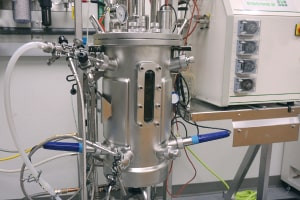Mass and heat transfer are crucial because all the processes by which raw materials are converted to final products must undergo heat and mass transfer. The fundamental concepts, principles, and applications of heat and mass transfer processes - such as molecular diffusion, interphase mass transfer theory, and mass transfer coefficients - will be covered in this course. You will learn about molecular diffusion and its role in bioprocessing such as mixing and mass transfer across a phase boundary. Interphase mass transfers are of interest in separation processes. The theories of interphase mass transfer - such as the film and penetration theory - will be discussed. Learn how to measure oxygen uptake rate useful in assessing growth, viability, and metabolic activity. Uncover the mass transfer coefficient and determine cell concentration that can be supported by the fermenter's oxygen-transfer system. Factors affecting cellular oxygen demand and the steps for oxygen transport from gas bubble to cell are presented. Several common problems are solved to illustrate the concepts clearly.
Next, the factors affecting oxygen supply rate and the variables that can be manipulated to change the oxygen supply rate will be explained. Learn the equation for oxygen transfer rate such as the static and dynamic method. The correlation for mass transfer coefficient, the functions of an agitator, and how to determine power consumption by the impeller will be explored. Familiarize yourself with the classification of fluids based on their behaviours as Newtonian or non-Newtonian fluid and learn about Newton's law of viscosity, the power-law model, and time-dependent behaviour. You will study the common types of heat transfer operation in the fermentation process that include In situ batch sterilization of liquid medium and temperature control during reactor operation. Find out the different heat combustion of biomass, how to design batch heat exchanger and the model equation for the batch system. Heat treatment is one of the most widely used methods for the destruction of spoilage and micro-organisms, you will consider the sterilization time required for reducing the original number of viable cells and how heat is used in the destruction of micro-organisms. The general equation for temperature as a function of time during the heating and cooling periods of batch sterilization will be explained. Explore the key points in the design procedures of batch sterilization and then the continuous heat sterilization process used in industry such as the continuous steam injection with flash cooling. The main advantages of continuous sterilization compared to batch sterilization will be explored.
Mass transfer operations are largely the responsibility of chemical engineers, but practitioners from other engineering disciplines also find them necessary for their work. Practising engineers in chemistry and biotechnology, as well as medical researchers, will find this fundamental and technical information useful to refresh their knowledge and skills. This course will also provide bioprocessing students with the theoretical or analytical background to understanding heat and mass transfer operations in bioreactors as well as their applications. Boost your bioengineering knowledge and skills, by studying this invaluable course. Enrol today!
What You Will Learn In This Free Course
View All Learning Outcomes View Less All Alison courses are free to enrol, study, and complete. To successfully complete this Certificate course and become an Alison Graduate, you need to achieve 80% or higher in each course assessment.
Once you have completed this Certificate course, you have the option to acquire an official Certificate, which is a great way to share your achievement with the world.
Your Alison certificate is:
- Ideal for sharing with potential employers.
- Great for your CV, professional social media profiles, and job applications.
- An indication of your commitment to continuously learn, upskill, and achieve high results.
- An incentive for you to continue empowering yourself through lifelong learning.
Alison offers 2 types of Certificate for completed Certificate courses:
- Digital Certificate: a downloadable Certificate in PDF format immediately available to you when you complete your purchase.
- Physical Certificate: a physical version of your officially branded and security-marked Certificate
All Certificate are available to purchase through the Alison Shop. For more information on purchasing Alison Certificate, please visit our FAQs. If you decide not to purchase your Alison Certificate, you can still demonstrate your achievement by sharing your Learner Record or Learner Achievement Verification, both of which are accessible from your Account Settings.











 Avg. Hours
Avg. Hours  Contains Video
Contains Video  CPD Accredited
CPD Accredited 
 Total XP:
Total XP: 
 Knowledge & Skills You Will Learn
Knowledge & Skills You Will Learn 







